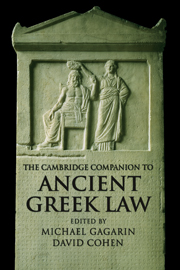Book contents
- Frontmatter
- Introduction
- Part 1: Law in Greece
- Part 2: Law in Athens I: Procedure
- 5 Law and Oratory at Athens
- 6 Relevance in Athenian Courts
- 7 Differentiated Rhetorical Strategies in the Athenian Courts
- 8 The Role of the Witness in Athenian Law
- 9 Theories of Punishment
- 10 The Rhetoric of Law in Fourth-Century Athens
- Part 3: Law in Athens II: Substantive Law
- Part 4: Law outside Athens
- Part 5: Other Approaches to Greek Law
- Index
9 - Theories of Punishment
from Part 2: - Law in Athens I: Procedure
Published online by Cambridge University Press: 28 August 2006
- Frontmatter
- Introduction
- Part 1: Law in Greece
- Part 2: Law in Athens I: Procedure
- 5 Law and Oratory at Athens
- 6 Relevance in Athenian Courts
- 7 Differentiated Rhetorical Strategies in the Athenian Courts
- 8 The Role of the Witness in Athenian Law
- 9 Theories of Punishment
- 10 The Rhetoric of Law in Fourth-Century Athens
- Part 3: Law in Athens II: Substantive Law
- Part 4: Law outside Athens
- Part 5: Other Approaches to Greek Law
- Index
Summary
Legal punishment typically involves the deliberate infliction of pain, harm, or loss on an individual by the state or community in the form of a judicial response to the violation of a legal norm. Legal punishment is what gives the criminal law its coercive force and distinguishes, in modern legal systems, criminal law norms from the norms of contract, property, and the like. In different legal systems punishment may take different forms: loss of life, liberty, or property; deprivations of civic rights or social status; banishment; dishonor; torture, branding, or mutilation; outlawry/prescription; or the infliction of such penalties on family or relatives of the convicted person. All of these forms of punishment are found in some manner in Athenian law, though not all of them could be inflicted on citizens, as opposed to foreigners or slaves. As Demosthenes puts it in Against Androtion (22.55-56), what distinguishes the slave from the free man is that the latter is sacrosanct in his person/body, which is respected even when he is convicted of wrongdoing. The slave, on the other hand pays the penalty with his body. Indeed, punishment in most premodern legal systems was linked to civic and social status. It is beyond the scope of this chapter to address the practices and modalities of punishment at Athens, though there is much room for further research in this area.
- Type
- Chapter
- Information
- The Cambridge Companion to Ancient Greek Law , pp. 170 - 190Publisher: Cambridge University PressPrint publication year: 2005
- 4
- Cited by

